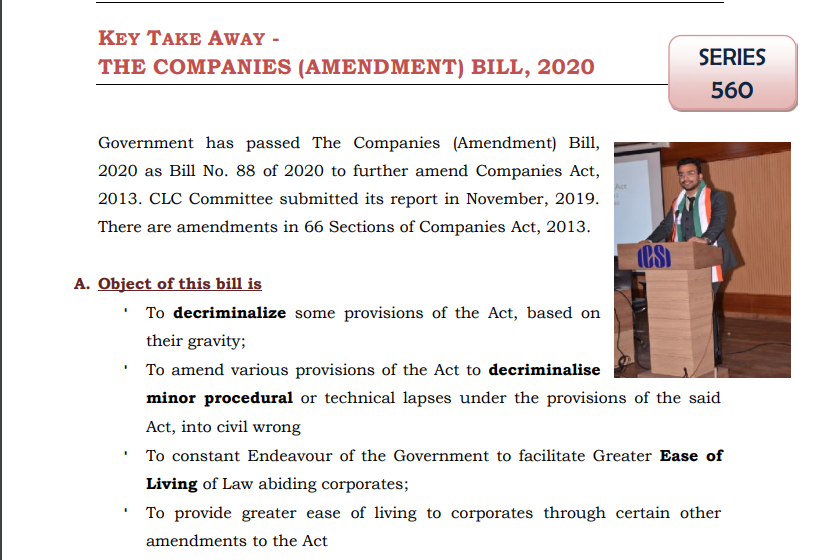Relevance: Prelims/Mains: G.S paper III: Economy

Context:
- To facilitate ease of doing business in India, the Ministry of Corporate Affairs has sought to decriminalise the Companies Act, 2013 by introducing the Companies (Amendment) Act, 2019, and the Companies (Amendment) Bill, 2020.
• While the Novel COVID-19 will inevitably have a wide-ranging impact on companies in India, hopefully these timely amendments will foster faith, improve corporate compliance, and facilitate investments.
Background:
- The Companies (Amendment) Bill, 2020 was approved by the Cabinet and introduced in the Lok Sabha.
• Over the past year, this Bill has been the second attempt of the Ministry of Corporate Affairs to decriminalise offences under the Companies Act, 2013, the first being the passing of the Companies (Amendment) Act, 2019.
Companies (Amendment) Act, 2019:
- Following the recommendation of ‘Report of the Committee to Review Offences under the Companies Act, 2013’, the 2019 Amendment decriminalised 16 sections of the Act to civil violations.
• The 2019 Amendment eliminates the criminality of these violations by levying monetary penalties instead of criminal fines.
• Levying these penalties has also been shifted from courts to in-house adjudication mechanisms (IAM) under Section 454 of the Act, whereby adjudicating officers appointed by the Central Government determine the offences and enable companies to promptly communicate, represent, and resolve defaults.
• Though these amendments were initially brought in by the Companies (Amendment) Ordinance, 2018, the Companies (Amendment) Ordinance, 2019, and the Companies (Amendment) Second Ordinance, 2019, it finally received Parliament assent by the 2019 Amendment.
Decriminalise the Act:
- The Company Law Committee (CLC) was constituted to further decriminalise the Act, as a concomitant measure to support the ministry’s objectives.
• The recommendations of the report of the CLC, as is now in the Bill, moots the fact that decriminalisation of minor non-compliance instils confidence in both domestic and global players and boosts foreign investments.
• The CLC observes that despite the rigours of criminal law, the efficiency of criminal law with regard to corporate misconduct is open to question. Criminal prosecutions are time-consuming and complex.
• Accordingly, some scholars argue for corporate criminal offences to be completely replaced by civil prosecution.
• Another school of thought recommends that penalties not commensurate with the offence/default may be counter-productive and, instead, could incentivise non-compliance.
• Accordingly, the report recommends decriminalising technical and minor non-compliance, while retaining strict criminal enforcement for serious, fraudulent offences that jeopardise and prejudice public interest.
The Companies (Amendment) Bill, 2020:
- Based on the recommendations of the report, the Bill proposes to, decriminalise the Act under the following framework:
Re-categorization of 23 compoundable offences to the IAM:
- Offences such as non-maintenance of company records at the registered office, non-issuance of statutory notices, non-compliance of disclosure obligations, etc. do not involve objective determination, exercise discretion, are easily determined by the MCA21 system and, hence, may be treated as civil wrongs, determined by the IAM framework.
Omission of the 7 compoundable offences:
- The offences proposed to be omitted are those that may be dealt with through other laws.
• The offences related to non-compliance with orders of the National Company Law Tribunal (NCLT) may be dealt with by NCLT contempt jurisdiction, instead of being treated as separate offences.
• Similarly, non-compliance by company liquidators can be dealt with through the relevant provision of the Insolvency and Bankruptcy Code, 2016.
Limiting 11 compoundable offences to fine only:
- It is proposed that only a criminal fine be imposed for offences that are substantial enough to warrant criminal liability, but do not warrant punishment by incarceration upon conviction, particularly if the compoundable offences do not involve substantial public interest.
• Accordingly, punishment for non-maintenance of account books at the registered office, non-compliance/contravention of public-offer and buy-back requirements, etc. may be accordingly restricted.
Alternate framework for 5 offences:
- It is proposed that alternate frameworks could better achieve the intended aim of certain penal provisions in the Act, such as non-cooperation by promoters, directors, etc. with the company liquidator, for which corresponding provisions of the Insolvency and Bankruptcy Code (IBC) may be inserted.
• Similarly, the maximum permissible fine for the initial offence for which a compounding application has been made may be doubled for non-compliance of an NCLT, or Regional Director’s order of compounding by an employee or officer of the company.
Significance:
Lesser penalties for certain offences:
- Section 446B is amended to provide that non-compliance by One Person Companies, Small Companies, Start-up Companies or Producer Companies, or by any of its persons or officer in default, are only liable to one-half the penalty specified in the respective provisions, subject to a maximum of Rs. 2 lakh in case of a company and Rs. 1 lakh in case of person or default officer.
Benefit to Independent Directors (ID):
- IDs have been recently in the spotlight for corporate lapses and violations.
• The amendments are vital for IDs to dissociate them from personal liabilities of the operational lapses and violations, especially when the offence has been committed without any evidence attributing knowledge, consent, connivance, or lack of diligence of the IDs.
• It directs that civil or criminal proceedings not be unnecessarily initiated against the IDs, unless there is sufficient evidence, and if already initiated, must be reviewed.
Way forward:
- The aforementioned recommendations endeavour to simplify and accelerate the processes of rectifying defaults by paying penalties, instead of fighting a criminal trial.
• It also benefits the State by reducing the burden on courts, allowing them to focus on serious offences.
• These amendments are admirable steps towards the three-pronged goal of:
• To reducing the burden on company courts,
• To ensuring investor interests, and
• To facilitating the ease of doing business while collaterally safeguarding and incentivizing senior management to remain invested.
Conclusion:
- This could well be the step towards showing intent to incentivize domestic and global investments, especially post COVID-19.
For more such notes, Articles, News & Views Join our Telegram Channel.
Click the link below to see the details about the UPSC –Civils courses offered by Triumph IAS. https://triumphias.com/pages-all-courses.php

